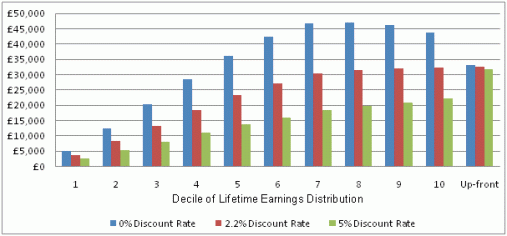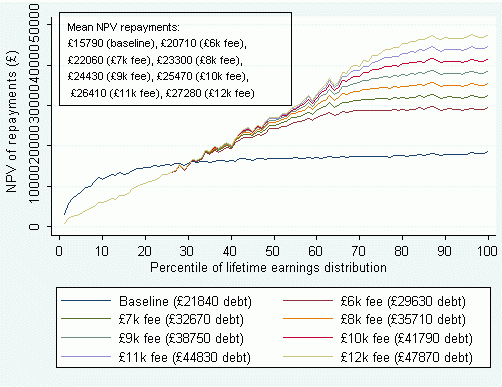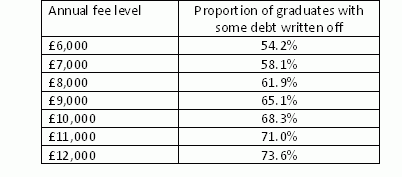Lord Browne's recommendations for higher education funding have provoked controversy. The potential sharp increase in tuition fees has grabbed the headlines, but another proposed measure has also received considerable attention: increasing the interest rate on student loans to 2.2% above RPI inflation. There have also been criticisms of the review's alleged lack of focus on the potential for a graduate tax. In this Observation, we explore both issues in some detail.
When is a pound not a pound?
It has been claimed by the Social Market Foundation (SMF) that middle-earning graduates face the risk of paying more for their university experience than the highest earning graduates, as a result of 2.2% real interest rate. But our analysis suggests that graduates with higher earnings would repay unambiguously more than their lower-earning counterparts.
Under Lord Browne's recommendations, graduates on lower incomes would not face the 2.2% real interest rate. Assuming a typical debt of £30,000 upon graduation, an individual would need to earn around £28,500 in real terms to service the full amount of interest. For graduates earning between £21,000 and this level, the interest charged would be capped to match their repayment, while for graduates earning below £21,000 no interest above inflation would be levied. Not only does this mechanism limit how much interest lower-earning graduates must pay, but it also prevents the debt from growing in real terms because the interest is always covered: either by the graduate, or partly or fully by the Government.
It is also worth highlighting the arithmetic involved in assessing - and comparing - the total value of repayments that different graduates make over their lifetime. Payments that occur in future should be discounted more heavily as they are inherently less valuable, and the further away in the future a payment is, the lower its corresponding worth in today's terms.
The choice of discount rate is important because it affects one's conclusion about whether the spread of graduate repayments is progressive or not. This is shown clearly in Figure 1, which demonstrates the effect of different discounting scenarios on the NPV of repayments that come from each graduate income decile group. The underlying data are based on the IFS's own model of graduates' lifetime earnings.
Figure 1: Graduate repayments with a £7,000 fee, under different discount rate assumptions

The analysis produced by the SMF discounts future repayments only by the rate of inflation. According to those figures, middle earners appear to pay more in inflation-adjusted terms than the highest earning graduates. As the discount rate assumed by the SMF is less than the proposed real interest rate, it necessarily means at some point higher earning graduates will pay less in inflation-adjusted terms than lower earning graduates. However, our analysis suggests that even with a zero real discount rate, this will be only be true for those in the top two deciles of lifetime graduate earnings, and not in the top six deciles as suggested by the SMF.
While inflation is one reason to put a lower value on payments made in future, there are many others, including uncertainty about the graduate's future and their access to credit. Indeed, a real discount rate of 0% (as assumed by the SMF) is uncommon: the Government's own accounts and economic forecasts sensibly use higher rates of discount to evaluate future liabilities and revenue streams. The analysis in the Browne Review, as well as IFS's own analysis, is based on a discount rate of inflation plus 2.2%. Under this assumption the spread of repayments is progressive right across the graduate earning distribution.
A graduate tax by another name
Ed Miliband, the new Leader of the Opposition, has voiced calls for a graduate tax to be introduced. In fact the present system of income-contingent repayments is for many effectively a temporary graduate tax. Graduates who do not pay off their debt in full under the current system face a 25-year graduate tax of 9% above £15,000 (with this threshold fixed in real terms). Under Lord Browne's proposals, this would for many become a 30-year graduate tax of 9% above £21,000 (with this threshold indexed in line with earnings). Indeed, for the lowest-earning 30% of graduates the actual level of fees makes no difference to how much they repay, as shown in Figure 2.
Figure 2. Total repayments under different fee levels

Under Lord Browne's proposals, more than half of graduates would make repayments for the full 30 years, effectively paying a graduate tax over that period. With higher fee levels this proportion can only increase, as demonstrated in Table 1. Paradoxically, therefore, the more fees go up, the more the system approximates a graduate tax - indeed, a pure graduate tax would arise under the current system if fees were infinitely high. The key differences are that under a fee regime, there is a link between how much students pay and how much universities receive thereby helping a market to operate among universities.
Table 1: Proportion of students who have their debt written off after 30 years

A focus on headline fee levels is not very informative given that repayments depend only on future returns in the labour market. Potential students would be best advised not to concentrate on the notional debt attached to degree courses, and instead go the university of their choice regardless of the fees. Assuming they do not have a cheaper form of credit they should borrow from the government if they are prepared to pay a graduate tax of 9% for 30 years. They may be fortunate, of course, and earn enough to pay the tax for less than 30 years. Either way, those who oppose the fee regime and advocate a graduate tax would - perhaps ironically - have their demands met if fees continue to rise.











